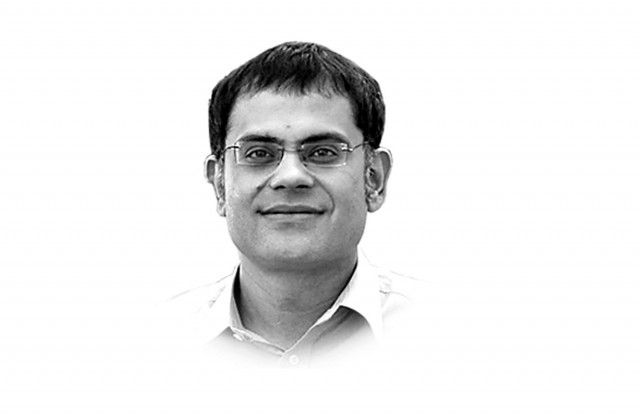Of scripted marches
Regardless of what happens next, this is the gravest challenge to Pakistan’s democratic process since 2007.

Dr Qadri wants the electoral system to be cleansed of corrupt politicians. General Ayub’s regime enacted laws in 1959 to disqualify corrupt politicians. Before every election, such tall claims are made. General Zia raised the slogan of ‘accountability first, elections later’, Farooq Leghari promised the same in 1996, and our most recent ‘saviour’, General Musharraf, also kept on reiterating the same throughout the years of his dictatorship. Consequently, we are a country with large numbers of influential people in media, academia, bureaucracy, and other spheres, who hold that the worthless crooks, i.e. the politicians need to be ousted every time we get on to the business of implementing democracy.
Politicians, on the other hand, are not the best role models available. Even the most daring and visionary of them i.e. Zulfikar Ali Bhutto was nurtured by the military in the 1960s. His successors followed suit and always found engagement and deals with the military as the route to power. Quite honestly, what else can they do when the rules of the game are determined by the civil-military apparatus of yore, and military-intelligence complex of today!
This is why Tahirul Qadri’s faux revolution is both suspicious and dangerous for the future of Pakistan’s democratic trajectory. We know that the military has denied any role in spurring this ‘revolution’ and, frankly, there is little evidence to counter its claim. However, the advocacy of unconstitutional solutions to Pakistan’s political problems smacks of the GHQ script used in 1958, 1969, 1977 and 1999. The same obsessions — corruption, misgovernance, incompetence and ‘loot maar’ — appear to be the underlying reason for this revolution. Marx and Marxists worldwide would be devastated at the abuse of the term ‘long march’, which is being used to invoke the unelected institutions i.e. the judiciary, the military and the media, to undermine and sabotage the will of the people and representative governance.
The other dimension of this ‘revolution’ concerns the assumed shift within Pakistan’s security doctrine. There have been reports of a big strategic rethink underway, which attempts to replace jihadist Islam with a moderate face in line with the global pressure on Pakistan to do something about its Deobandi-Salafi strategic assets. Perhaps these speculations are far-fetched, and only time will tell how far the state has moved on. One reality is getting clearer: the impending transfer of power, managed and overseen by civilians through parliamentary processes, is not seen as a great idea as it might squeeze the already-shrinking space for military domination in Pakistan’s public life.
The forthcoming elections, now facing a question mark, are likely to return a prodigal-son-gone-rebel Nawaz Sharif or the wily chess player Zardari back into power, and that too within a few months! Such a prospect is troublesome for many within the enclaves of Pakistani state power. Therefore, the failed ‘Bangladesh model’ of neutral technocratic caretakers looms on the limited imagination of the power-wielders. Qadri could push events towards that. Or he may just succeed halfway in getting a caretaker arrangement which inspires confidence among the unelected bosses of Pakistan. Regardless of what happens next, this is the gravest challenge to Pakistan’s democratic process since 2007 when Benazir Bhutto was murdered in Rawalpindi and the country was gripped by anarchy and uncertainty.
This is also a time for testing the honed skills of President Zardari, who is no walkover, and the measured instincts of Nawaz Sharif, who has been through the mill over decades. Imran Khan, whose legitimacy also hangs in the balance, will need to show more foresight than he has demonstrated thus far. Above all, Pakistan’s out-of-control electronic media needs to remember that by celebrating extra-constitutional deviations, it may just be inflicting self-harm by curbing its own future freedoms.
Published in The Express Tribune, January 17th, 2013.












COMMENTS
Comments are moderated and generally will be posted if they are on-topic and not abusive.
For more information, please see our Comments FAQ